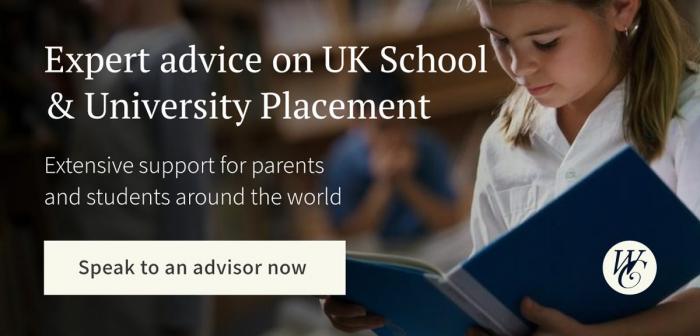
Explaining the UK Education System
The UK education system is split into two areas.
These are between state funded schools, where education is free, and independent schools which are private schools overseen by a board of governors or trustees, charging fees. To qualify for a state school, a family needs to have a UK address and apply for a school through their local Education Authority. For families arriving in the UK for work or schooling alone, independent education allows a family to have a far wider choice of schools to suit each child and is not dependent on where you live.
The UK independent education system starts with Nursery or Pre-School at age 2+, through to Pre-prep and Prep (private primary schools) from ages 4 - 11 or 13, followed by Senior School from ages 11 or 13 - 18. Higher education is for 18+.
Independent schools in the UK education system range from the world famous boarding schools such as Eton, Winchester and Wycombe Abbey to local day schools, and the fees vary widely. A common misconception is that all independent schools are in the same category as the world famous boarding names. Whilst these schools have fees of £40,000+ per year, average day fees are more like £17,000. Boarding has changed dramatically over the last decade with options for flexi or weekly boarding popular with busy families. For families based overseas, it is crucial to find a school where full time boarding still exists to make sure a pupil has busy weekends.
These independent schools follow the National Curriculum set out by the UK education system but are not bound by it, giving them the independence to operate outside of government regulations. However, they do have to conform to official standards of education, health and safety and are regularly inspected (by the Independent Schools Inspectorate either as well as or instead of by Ofsted). Most independent schools regularly assess pupils against national test scores but pride themselves on the breadth of academic and extra-curricular options open to pupils, with subjects such as Mandarin being offered from a young age. Sport, drama, art and music are all an important part of the school curriculum, with a wide range of school clubs on offer. In addition, independent schools stress small class sizes, individual attention, nurturing intellectual curiosity and encouraging critical thinking.
Entry to independent schools is often academically selective, with places at London day schools awarded at assessment as young as age 4. Rural prep schools tend to have a more relaxed entry process based on a visit and possible English assessment for non native speakers. However, senior schools are increasingly pre-testing up to two years in advance of entry at age 13, and William Clarence would encourage families to start planning early.
As part of the UK education system, all children take GCSEs (General Certificate of Secondary Education) exams at age 16. The core subjects of Maths, English and Science are taken at GCSE with a number of other subjects, usually around ten in total, and are studied for two years. For those entering the UK independent system, it is very difficult to enter at age 15 (halfway through the GCSE curriculum), and schools will often not accept pupils at this stage. At age 18, pupils specialise further, with a range of options from A levels, IB, Pre-U or more vocational qualifications such as BTECs.
Once students have finished school, they can choose to either begin their journey into the world of work or progress into higher education. Higher education can be accessed either through a university or further education college, and gives students the chance to obtain one (or more if they choose) of several kinds of qualifications, such as a Foundation degree, Bachelor’s degree, Postgraduate degree - including Masters and Doctorates - Higher National Certificates (HNC) or Higher National Diplomas (HND). Higher education can be accessed at any age from 18 onwards.
Whatever age or stage of education your child is at, our team at William Clarence will be with you every step of the way to ensure they secure a place at the school that best suits their needs and will help them to flourish. Contact our team today for more information.

